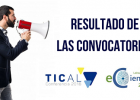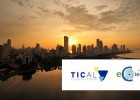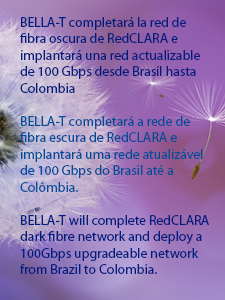Fostering the creation of global user communities MAGIC project Work Package 5 will carry out the following tasks in order to achieve this significan goal:
Task 5.1 Agreements on a set of worldwide user communities of common interest to the participating regions
This task will define a set of priority areas common to MAGIC regions upon which Global Science Communities will be developed. This will scale up the methodology successfully used by RedCLARA in developing regional communities in Latin America. To reach agreement on global priority areas that are relevant to all regions, a three-staged approach will be followed:
a) Reviewing broader worldwide priority areas for research and development as described by international bodies such as the United Nations, the World Bank, etc.
b) Through the regional partners, review of regional research priorities areas as described by regional bodies.
c) Definition of global priorities that are common to the MAGIC regions and corresponding to prevailing needs.
Based on the agreed priority areas three Global Science Communities will be developed and calls sent out to researchers in all regions to come together and join their energies. however, for global purposes this number has been chosen, to ease the difficulty of management and coordination worldwide To ensure sustainability of the communities, work plans will be developed in coordination with community leadership. Activities and successes of the communities will be monitored and disseminated worldwide in order to encourage the creation of new ones.
Task 5.2 Implementation of an Information System on worldwide funding opportunities aimed at the end users and the user communities
This task proposes to extend/update the Funding Opportunities Database and Partner Search application developed by the ELCIRA Project to cover other MAGIC regions and provide valuable funding information for the global communities and other worldwide research groups. With this service the project will be able to advertise current funding opportunities given by different donors to encourage research and science development in developing countries. Using the portal, researchers will have a one-stop-shop for information about research grants and calls for proposals. Also researcher and members of the Global Science Communities will be able to search for partners. The application will improve and strengthen regional academic networks and international partnerships using collaborative platforms.
Task 5.3: Development of a set of Worldwide Virtual Days to foster collaboration at a worldwide scale on the above selected topics
Virtual Days – distributed events held via videoconference – have been successfully organised by RedCLARA since the days of the ALICE2 project. Within the framework of the ELCIRA project, a Blueprint for organising Virtual Days has been developed, which gives a step-by-step outline of how to organise the events via videoconference. This task will see the implementation of Worldwide Virtual Days on subjects/themes that will be defined in liaison with Global Science Communities invited/selected in T5.1.
The Worldwide Virtual Days will be aimed at sharing information and experiences among experts in the field and to raise awareness of prevailing issues from Global Science Communities to wider audiences including policy makers. In liaison with the communities, a template programme will be developed which will be implemented with slight modifications to accommodate local community needs. To address time zone problems that arise with real-time global events, the virtual days will be staged in blocks by time zone and will be held on consecutive days. Dissemination of the Worldwide Virtual Days will be held in coordination with WP6.
Task 5.4: H2020 Virtual Information Days to promote participation in International Calls
This task seeks to foster the collaborative work of Global Science Communities by actively promoting the participation of researchers from the MAGIC region in European Commission Calls and those of other international funding agencies with high impact in the participating regions and other networking activities.
The task will organise and coordinate at least two continental videoconferences (depending upon the number of existing calls) to disseminate the funding opportunities available in the H2020 framework programme and other funding opportunities. This activity will serve as a bridge between the research communities and the personnel of the National Science and Technology funding agencies with the EU Project Officers and other international donor agencies Officers.
Task 5.5: Training material for the use of cloud-provided applications for collaboration
This task will develop training materials for the use of cloud-provided applications for collaboration by the Global Science Communities. Collaborative tools may include wikis, file transfer tools, web-conferencing facilities, etc. Once the Global Science Communities are developed (T5.1), they will define how they want to collaborate. Working in liaison with WP3, this task will conduct an inventory of the collaborative tools that the communities would like to use. Building on the experience of the ELCIRA project in preparing training material on the use of services in video and other formats, this Task will develop virtual materials illustrating how to use the collaborative tools. This will be aimed at simplifying the ease of using the tools. The material developed will be available on the collaboration portal (T5.2) and will be disseminated in conjunction with WP6.
Task 5.6: Worldwide User Communities virtual meetings and seminars
In order to improve the communication and the relationship between the members of the Global Science Communities, as well as the personnel of the National Research and Education Networks (NRENs), Regional Research and Educations Networks, and other science and high education organisations, different virtual meetings and seminars will be organised in liaison with MAGIC WP6 members. These events will be as follows:
- Global Science Communities Project, Opening Conference
The main objective of this event will be to invite all the groups, communities and researchers from the selected worldwide priority areas to be part of the three Global Science Communities that the MAGIC Project will support. To do so, the WP6 MAGIC team, will present the results of the study on worldwide priority areas for research and development and the global priorities topic of main interest for the MAGIC regions.
- Regional Best Practice Meeting - Best practices and general presentation of the members of the new MAGIC Global Scientific Communities
After working on the construction of the three Global Science Communities and having started their activities, the first virtual global communities meeting will be held. This activity will be aimed at allowing the members of each global communities to present themselves by showing their regional best practices in the field of the community as well as their scientific-academic interest and expectations on working together in the community.
- Global Science Communities: Experiences and challenges of working on a collaborative way
This second virtual global community meeting will address the topic of how to ensure the success of the global virtual communities. The objective of the activity will be to give tools and advice to the members of the communities on best practices in carrying out collaborative work worldwide. To achieve this, the programme of the event will include presentations from experts in the field; and testimonials of other communities and similar scientific and collaborative groups.
- Global Science Communities Project, Closing Conference
This last event will present the results of the growth and the future of the Global Science Communities. Here, both the WP6 MAGIC team and the members of the Global Communities will share the most important and remarkable experiences acquired and challenges faced since the beginning of the MAGIC project. The objective of this activity is to spread the Global Community methodology constructed during the project and encourage other organisations and groups to reproduce the model. Also, this activity will ensure the cohesion of each global community for the years to follow.























